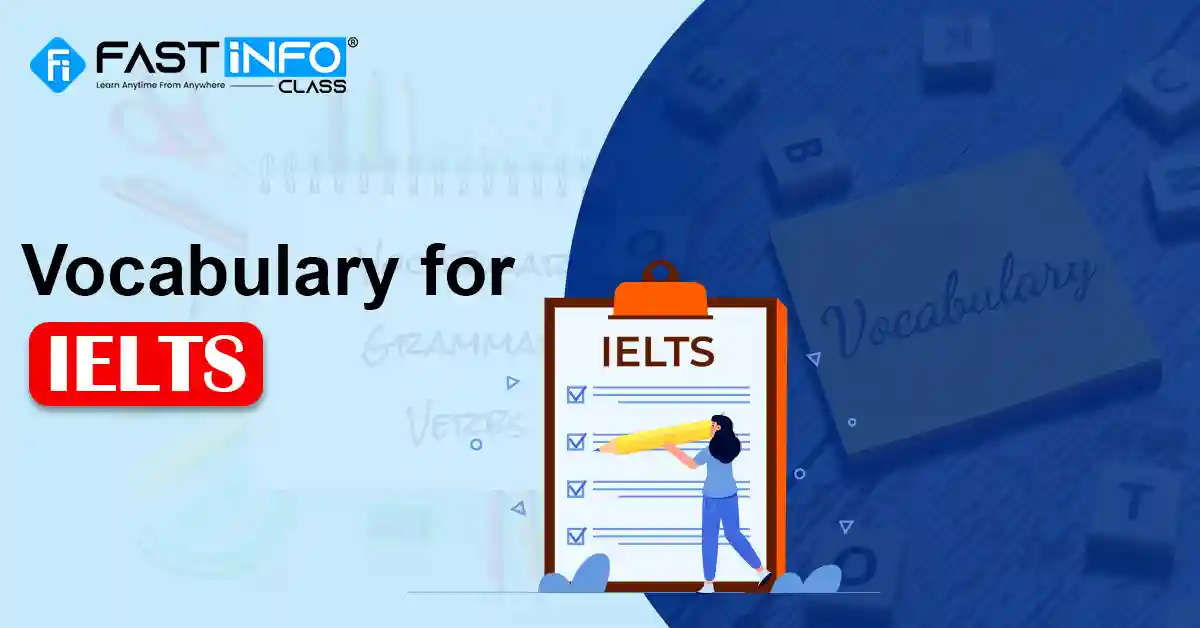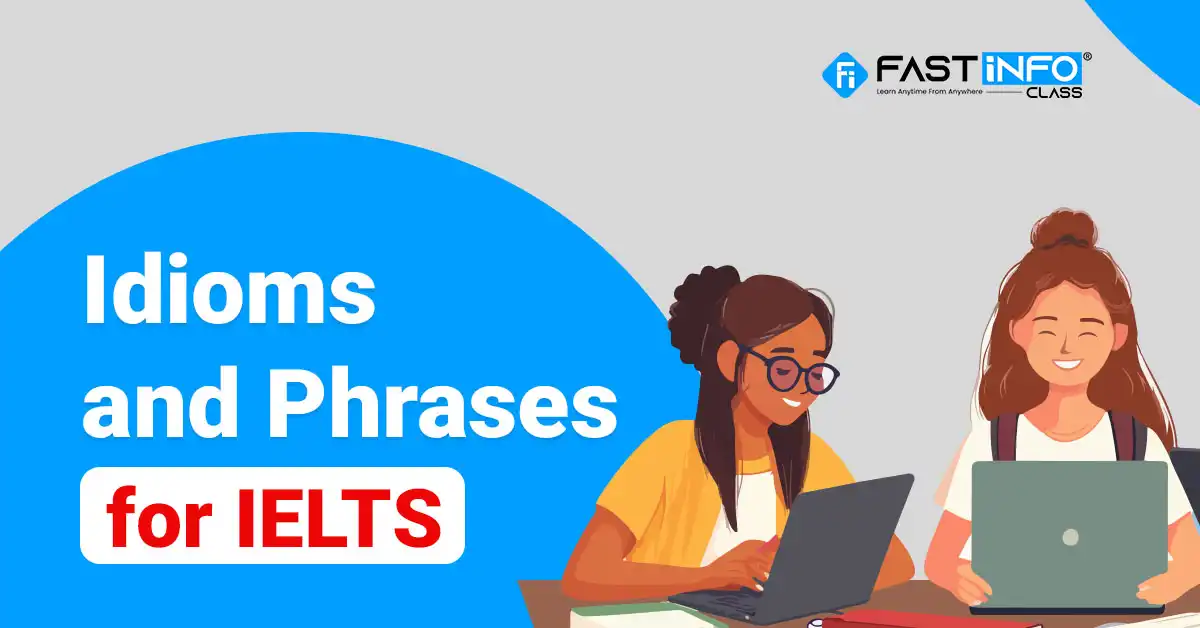Self Introduction in English for Job Interviews: A Guide
29 Dec, 2025
Welcome Offer for First Time Customers Get 15% off USE CODE: NEW15 AT CHECKOUT

Welcome Offer for First Time Customers Get 15% off USE CODE: NEW15 AT CHECKOUT

Welcome Offer for First Time Customers Get 15% off USE CODE: NEW15 AT CHECKOUT

Welcome Offer for First Time Customers Get 15% off USE CODE: NEW15 AT CHECKOUT

Welcome Offer for First Time Customers Get 15% off USE CODE: NEW15 AT CHECKOUT

Welcome Offer for First Time Customers Get 15% off USE CODE: NEW15 AT CHECKOUT

Welcome Offer for First Time Customers Get 15% off USE CODE: NEW15 AT CHECKOUT

Welcome Offer for First Time Customers Get 15% off USE CODE: NEW15 AT CHECKOUT


 By FastInfo Class
Published On 01 Sep 2025
Category IELTS
By FastInfo Class
Published On 01 Sep 2025
Category IELTS
Many students find IELTS preparation challenging, but with the right approach, they can improve their English skills and achieve a high score.The IELTS exam is considered one of the most recognised English language tests in the world. Effective preparation requires planning, consistent practice, and a strong grasp of the exam format. A student needs to focus on listening, reading, writing, and speaking with a clear strategy for effective exam preparation. In this blog, you will learn how to start preparing for IELTS Exam effectively.
The IELTS (International English Language Testing System refers to a globally recognised test which measures English proficiency. This test is accepted by universities, employers, and immigration authorities. The exam provides a reliable measure of English skills in real-life situations. Joining a trusted institute such as FastInfo Class ensures proper guidance on each section with expert strategies. This test allows candidates to achieve study, work, migration goals abroad, and more.
There are four main IELTS Sections:
Listening
The listening section helps to measure the ability to understand spoken English. This section allows candidates to hear conversations, lectures, and monologues. They answer questions by finding key information, understanding opinions, and following the flow of conversation. As a student, you need to focus, pay careful attention, and understand several accents for listening.
Reading
A reading section checks a student's ability to follow and understand written English. This section allows candidates to read passages and answer questions to find specific details. It also allows candidates to understand the main idea and interpret information. The text contains factual, analytical, and descriptive content topics. This section plays a crucial role in testing comprehension, vocabulary knowledge, and logical reasoning.
The writing section analyses students' ability to write English clearly and effectively. This section contains two tasks. The first task necessitates describing visual information, including graphs, charts, or diagrams. On the other hand, the second task allows students to write an essay on a given topic, presenting arguments or opinions with proper structure, clarity, and examples. This section helps to test grammar, vocabulary, and organisation.
The speaking section tests a candidate's communication skills in a face-to-face interview with an examiner. In this section, candidates need to answer questions on familiar topics, express opinions, and discuss abstract opinions. Speaking tests fluency, pronunciation, vocabulary, and the ability to explain thoughts clearly and logically.
There are two types of IELTS:
Each section receives a band score from 0 to 9. The overall band score is calculated as the average of the four sections. A candidate should understand the exam structure to focus on preparation, manage time effectively during the test, and improve weak areas.
Here is a step-by-step process to start preparing for IELTS:
Step 1: Assess Your Current English Level
Firstly, you must measure your English skills to start your preparation. Next, you need to take a free online IELTS practice test to check your level in each section. If you assess your current English level, you can easily identify your strong and weak areas. It will help you to focus on the sections that need improvement.
Step 2: Set Realistic Goals
You need to decide the target score that you want to achieve and set a clear timeline for preparation. Next, divide your study plan into daily, weekly, and monthly targets. This process will help you to become organised, motivated, and make steady progress towards your desired band score.
Step 3: Create a Study Schedule
Consistency plays a key role in preparation. Allocate specific hours each day for IELTS practice. Include all four sections of the exam in your schedule. A balanced routine helps improve every skill, avoids neglecting any area, and prepares you effectively for the actual test.
Step 4: Focus on Weak Areas First
Spend extra time improving the sections where you face challenges. If Writing requires improvement, practice writing essays regularly. If Listening is difficult, listen to English news, lectures, or podcasts. Strengthening weak areas early ensures a more balanced overall performance.
Step 5: Use Reliable Resources
As a candidate, you are required to choose official IELTS materials, verified online courses, mobile apps, and reputable practice books. Learning from trusted sources ensures preparation aligns with the latest 2025 exam patterns. You must always avoid outdated or unverified materials that may lead to confusion or incorrect practice. You can choose FastInfo Class, which provides updated resources and expert-designed study plans for IELTS Preparation.
Here are the effective study techniques for IELTS:
Listening tests the ability to understand spoken English in different contexts. Practice official IELTS audio materials, English news channels, and podcasts. Focus on recognising different accents, such as British, Australian, and American. Take notes while listening and summarise main points to improve comprehension. Use timed listening exercises to enhance speed and accuracy for the exam. Platforms like FastInfo Class can also help with this through mock listening tests, accent-specific practice tracks, and feedback on your note-taking and summaries.
Reading evaluates the ability to understand written English. Read newspapers, articles, and books daily to expand vocabulary and comprehension. Learn techniques such as skimming to identify main ideas and scanning to locate specific information. Solve past IELTS reading tests to familiarise yourself with question types. Manage your time carefully, ensuring that no single question takes too long. FastInfo Class can help with offering structured reading modules, timed practice tests, focused exercises, personalised feedback, and more to improve your speed and accuracy.
Writing assesses the ability to express ideas clearly and logically. Understand the structure of Task 1, which includes charts, graphs, or letters, and Task 2, which is an essay. Practice writing regularly to improve grammar, vocabulary, and sentence structure. Review your work to find mistakes and strengthen weak areas. Focus on creating coherent paragraphs and connecting ideas effectively. There is an institutions like FastInfo Class that train students with regular writing practice and feedback to improve structure, grammar, and vocabulary.
Speaking tests communication skills and fluency. Speak English daily with friends, teachers, or online partners. Institutions like FastInfo Class also conduct speaking practice sessions with trainers to build fluency and confidence. As a student, you can record your speech to check pronunciation, clarity, and confidence. Practice common IELTS speaking topics and sample questions. Pay attention to expressing ideas clearly and avoiding long pauses. Speaking regularly builds fluency and helps perform well during the exam interview.
Regular practice ensures steady improvement. Take weekly mock tests to monitor progress. Analyse mistakes carefully and concentrate on weak areas. Gradually increase the difficulty of practice exercises to match actual exam conditions. Consistent review and practice boost confidence, sharpen skills, and prepare candidates for the real test. You can enrol in FastInfo class to improve yourself. This platform provides weekly mock tests, detailed error analysis, personalised study plans, progressive difficulty levels, progress tracking, instructor feedback, and more to identify your weak areas for improvement.
Many students make mistakes during IELTS preparation that can lower their overall scores. Being aware of these errors helps you stay focused, improve effectively, and approach the exam with confidence.
Listed below are the common mistakes to avoid while preparing for IELTS:
Focusing only on strong sections creates an imbalance and can reduce your overall score. Identify the sections where you face difficulty, such as Writing or Listening, and dedicate extra effort to improve them. Strengthening weak areas ensures a more consistent performance across all parts of the exam.
Each IELTS section has strict time constraints. Practicing without a timer gives a false sense of readiness and affects time management during the real exam. Simulate actual exam conditions in practice tests to improve speed, accuracy, and confidence in handling the time pressure.
Memorising sample answers may seem helpful, but examiners assess your genuine language ability. Focus on understanding key concepts and expressing ideas clearly in your own words. Developing authentic communication skills leads to higher scores in the Writing and Speaking sections.
Strong vocabulary and correct grammar are essential for both Writing and Speaking. Ignoring these areas lowers language accuracy and clarity. Regular practice of sentence structures, word usage, and grammar rules strengthens language skills and improves overall exam performance.
Some students concentrate only on Reading and Writing, neglecting speaking. Daily practice of Speaking improves fluency, pronunciation, and confidence. Use conversations with friends, teachers, or online partners to develop the ability to express ideas clearly and naturally.
Practicing without analysing errors leads to repeated mistakes in the exam. Review your practice tests carefully, understand why mistakes occur, and correct them. Learning from errors ensures continuous improvement and better performance on the test day.
Taking regular mock tests is one of the most effective strategies for IELTS preparation in 2025. Mock tests help candidates understand the exam structure, manage time efficiently, and identify areas that require improvement. Honest self-evaluation after each test ensures steady progress and better performance on exam day.
Simulate the actual exam conditions by timing yourself for all four sections: Listening, Reading, Writing, and Speaking. Full-length tests help develop exam stamina and reduce anxiety. Practicing under real conditions allows candidates to familiarise themselves with question patterns, time limits, and the overall test environment. There are institutes like FastInfo Class that conduct regular mock tests under real exam conditions to help students assess performance accurately.
After completing a mock test, review each answer carefully. Identify mistakes and understand why an answer is incorrect. This analysis helps prevent repeated errors and strengthens problem-solving skills. Focus on improving both accuracy and approach in areas where mistakes occur.
Maintain a record of your scores for every section. Tracking progress over time shows improvements and highlights sections that require more practice. Regular monitoring motivates candidates and provides a clear picture of their readiness for the actual IELTS exam.
Use insights from mock tests to refine your study plan. Spend more time on weak areas while continuing practice in strong sections to maintain performance. This targeted preparation ensures balanced improvement and maximises chances of achieving the desired band score.
Regular mock tests combined with honest self-evaluation build confidence, improve accuracy, and prepare candidates thoroughly for the IELTS exam. Following this approach ensures readiness and helps achieve consistent results across all four sections.
Conclusion
Preparing for IELTS exam can feel challenging, but with a clear plan, consistent practice, and focused effort, success is within reach. Understanding the exam format, practising regularly, and improving weak areas are key to achieving a high band score. Avoiding common mistakes and using reliable resources makes your preparation more effective. Stay committed, track your progress, and approach the exam with confidence. This will help you in achieving your desired IELTS score.
If you want to do an IELTS course, contact FastInfo Class. They offer expert guidance, structured lessons, and personalised support to boost your skills, build confidence, and achieve your target band score.
Q1. How long should I prepare for IELTS to achieve a high score?
Your preparation time depends on your current English level. Generally candidates take 2-3 months preparing for IELTS. In case you are a beginner, then you will need around 4-6months to achieve your targeted band score.
Q2. Can I prepare for IELTS on my own, or do I need a tutor?
The simple answer is, Yes, you can. Self-study is possible. But candidates find it easier to stay consistent when they join professional classes such Fastinfo. Joining a class relieves you from the stress of finding the right preparation material. It also allows you to have more time to study rather than googling the right way.
Q3. Which IELTS module is the most challenging, and how can I improve it?
Many students find writing and speaking the hardest while preparing for IELTS. Regular practice, mock tests, and personalised feedback help improve clarity, grammar, and confidence in these sections.
Q4. Are online resources enough to prepare for IELTS in 2025?
Yes, reliable online courses, apps, and practice materials are very effective for preparing for IELTS. Combining them with mock tests and real-time speaking practice ensures complete preparation.
Q5. How can I track my progress while preparing for IELTS?
Take regular mock tests, record your scores in each section, analyse mistakes, and adjust your study plan accordingly. Tracking progress while preparing for IELTS helps improve weak areas and boosts confidence.

Self Introduction in English for Job Interviews: A Guide
29 Dec, 2025

10 Effective Ways to Improve IELTS Vocabulary
05 Dec, 2025

Common IELTS Speaking Topics & Questions for 2025-2026
02 Dec, 2025

Common Idioms and Phrases for IELTS
02 Dec, 2025

Best Conversation Topics In English For Daily Use
02 Dec, 2025

Daily English Conversation Practice for Beginners: 50 Useful Topics
29 Jun, 2023

Must Read Novels to Improve English for Beginners to Advanced
21 Feb, 2023

Top 15 Spoken English Books to Enhance Your Fluency
09 Sep, 2023

English Speaking Course for Beginners - Everything you must know
22 Sep, 2021

25 Commonly Mispronounced English Words in India
26 Apr, 2024